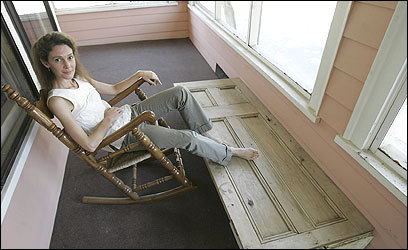
I think I've become a literary snob. Perhaps I already knew this but chose to ignore it. What has struck me is how I now distinguish between "good" literature and "mediocre" literature (forget "poor" literature, which is a contradiction in terms).
For instance, during the past two days I've started and quickly stopped reading two different novels. Two nights ago it was
John Irving's
Until I Find You and yesterday afternoon,
Marly Swick's
Evening News. I usually love Irving's work.
The World According to Garp and
A Prayer for Owen Meany are two of my favorite books (well, Garp and Owen are among my favorite characters). But within the first few pages of
Until I Find You, I found myself in a maze of ill-constructed paragraphs; this is an 800+ page novel! Sorry John, I don't have time for that.
And Swick's work. Well, I can't say I enjoyed the creative writing-class style of introducing characters, but I could have gotten past that if the subject weren't so disturbing. I started reading it because my novel is about a family in a difficult situation; hers is about a family coping with the death of a small child. But in her novel, a young boy and his friend from next door are playing with the friend's dad's handgun, which mom keeps hidden in a Kleenex tissue box. A few predictable moments later, BANG! and the little baby sister is bleeding out into her inflatable swimming pool while mom's reading a book. I'm sorry, I don't have much patience for idiots in real life, I don't need to read about fictional morons. Here's a life story for you: Kids,
don't play with guns! Parents,
don't leave loaded guns where your kids can get to them, especially if they don't know what the hell they're doing!
Now I'm reading
Whitney Otto's
Now You See Her. Heading into the story is a nice little acknowledgement page. She thanks her family and friends and her editor and agent. All good and proper. But then within the first couple pages there's a subject/verb agreement problem (i.e., the subject is singular, but the verb used was plural). This is basic, grammar school English class red-pen stuff. Ok, if it only happens once, we can chalk it up to an amazingly odd snafu (though you don't usually find these things on page 3). But then, another couple pages later, there's something even more egregious. The protagonist lists things she has: Gainful employment; three good friends;
two living parents... Four short paragraphs and a few lists later, the protagonist has telephoned her mother, "
now a widow..."
When did that happen? In the past 100 words? Did mom dump dad in a bitter divorce a few years ago? Who knows, it hasn't been mentioned.
I think I'd thank this agent too, because she hooked you up with an editor who can't read. Since this book was published in 1994, I presume these flaws have already been pointed out and I'm simply slow on the draw. And considering I received this book for free through a book exchange, and its Barnes & Noble discount price of $5.98 is still attached to the front cover, I don't think too many people are overly concerned about who's going to fix it.
To be fair, since I didn't have any other books with me and I'd already read the
One Story item I did have with me, I decided to read further in Otto's book. [Nota bene, One Story has a new address and it hasn't been corrected on their Web site -- so if your renewal was returned because the Post Office can't find them, don't fret, they've not gone out of business.]
And what I found is a story with promise. From what I can tell, it follows through on the fanciful "What if women over 40 actually
do become invisible." I'll give the book a second chance. When there aren't glaring grammatical or continuity problems, it reads easy (well, actually, she seems to have a love affair with annoying fragments; not the literary types that are easily comprehensible), and if I hate it after tomorrow, there's always a Friday crossword puzzle to piss me off.
Oh yeah, I discovered another thing tonight on the train: I really love pizza. A man on the train was eating a slice and I couldn't help but wish I had one too. Again, this may be something I already knew. Sometimes life is cruel.




